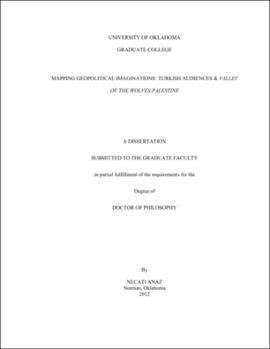| dc.contributor.advisor | Purcell, Darren | |
| dc.creator | Necati, ANAZ | |
| dc.date.accessioned | 2019-06-05T21:20:01Z | |
| dc.date.available | 2019-06-05T21:20:01Z | |
| dc.date.issued | 2012 | |
| dc.identifier | 9942730102042 | |
| dc.identifier.uri | https://hdl.handle.net/11244/320299 | |
| dc.description.abstract | This study explores how the Turkish film, Valley of the Wolves-Palestine, reflects the geopolitical imaginations of the Turkish people and how this political-action film is interpreted by different individuals in the post-9/11 world. To do this, I investigated three sites of the film: production includes film-making process and geopolitical conditions in which the film took shape; text, wherein geopolitical discourses are embedded, and; consumption, through which audiences make their meaning. I utilized a mixed-method approach, including interviews with one of the scriptwriters of the film and the Mavi Marmara activists, seven audience focus group discussions, analysis of online comments, and an online survey. The collected data, in general, showed that Turkish audiences\' reading of the film is diverse, but some commonalities were found. | |
| dc.description.abstract | This study suggests that Turkish audiences had pre-conceived notions about Israel and its policies toward Palestinians before they had seen the film. In this respect, the film did not particularly affect people\'s opinions about Israel, but it served as a conduit to have their voice be heard. Turkish audiences acknowledged the importance of publicizing the human drama in Palestine and valued the indispensability of bringing it to the attention of international movie audiences. In particular, this study argues that the film, and consumption of the film, is as much about understanding the Palestinian struggle as it is about re-presenting and re-orienting Turkey and its geopolitical position in the Middle East. | |
| dc.description.abstract | Finally, this study highlights that `negotiated\', `oppositional\', and `dominant\' readership was also present in the meaning-making of the film. Some Turkish audiences understand that the film is a cinematic challenge to Israel\'s Middle Eastern policies, while some see the film as an ethno-religious narrative operating within the limits of political economy and agenda setting. Also, a large number of people indicate that they understand the essence of the message in the film, which is to visualize the Palestinian drama, but they oppose the ways in which the message is represented. | |
| dc.format.extent | 385 pages | |
| dc.format.medium | application.pdf | |
| dc.language | en_US | |
| dc.relation.requires | Adobe Acrobat Reader | |
| dc.subject | Motion pictures--Political aspects--Turkey | |
| dc.subject | Motion pictures--Turkey--History | |
| dc.subject | Geopolitics in motion pictures | |
| dc.title | MAPPING GEOPOLITICAL IMAGINATIONS: TURKISH AUDIENCES & VALLEY OF THE WOLVES-PALESTINE | |
| dc.type | text | |
| dc.type | document | |
| dc.thesis.degree | Ph.D. | |
| ou.group | College of Atmospheric & Geographic Sciences::Department of Geography and Environmental Sustainability | |
